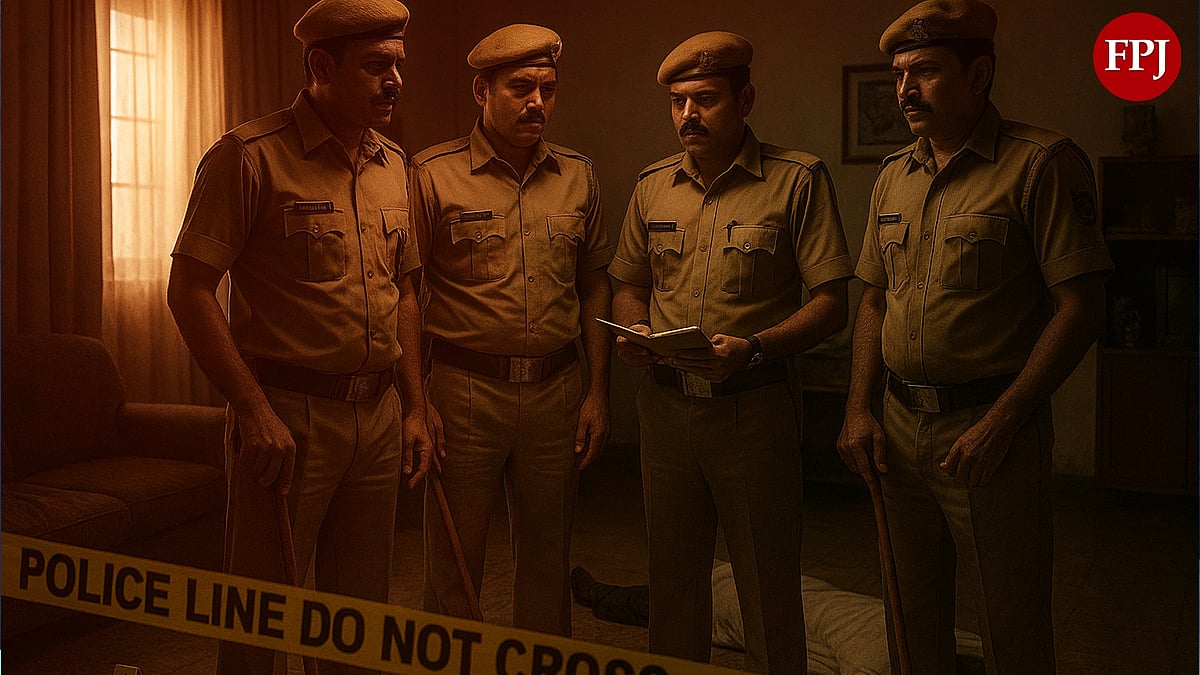Key in ‘Happiness is...’ in your Google search bar and a list of suggestions unfurls... ‘A state of mind. A choice. An inside job. Like a butterfly’. All probably true, and often just as elusive as said butterfly.
And so the chase continues, for most of us, this search for unalloyed, constant happiness. “People forget that happiness is always and only in the present moment, never in the future,” gently points out Swami Purnachaitanya.
Direct disciple of Gurudev Sri Sri Ravi Shankar and a Director of Programs for The Art of Living Foundation, he reminds, “Thinking you will be happy some day just results in you postponing your happiness. True happiness can only be found in the present, and it is already there, once you become free from stress, negative emotions, and craving and aversion.
Once you realise that happiness is your nature, then a beautiful shift happens in life. You stop living life as a pursuit of happiness, and start living life as an expression of happiness. You stop doing things to become happy, and instead you start doing things 'happily'!”
Confusing pleasure for happiness creates more hurdles. “We should look for reasonable happiness, contentment and satisfaction in life. Seeking constant pleasure is an obstacle to happiness.
Peak experiences can not last forever. Pleasure is momentary. Any pleasurable activity will become monotonous and boring after repetition,” avers psychiatrist Dr Chinmay Kulkarni. He believes it is important to find your unique meaning in life instead.
“If you work towards making life more meaningful, you will be ready for valleys as well as peaks. Being ready for that is the road to happiness. Seeking instant gratification all the time is the road to unhappiness.”
Admitting that we do put pressure on ourselves with our constant need to be happy, Dr Kersi Chavda, Psychiatrist, quips, “A person who is constantly happy will probably have a personality problem or will make others unhappy! What is necessary is for us to be pragmatic and accept that what goes up will come down.
Enjoy the good and accept that there will be bad! Some faith also helps... to sometimes lay your troubles at the foot of a benign superbeing reduces the pressure on occasion.”
Reiterating that happiness is an inside job, Fr Warner D’Souza, Parish Priest, St. Jude’s (Malad) maintains, “If you are happy within you will always be happy even during a tough phase.
Changing your attitude to one of gratitude will go a long way in living a happy life rather than seeking happiness in things and events.”
While all of us seek happiness and fulfillment, the problem lies in wanting it through achieving a particular desire or a particular manner.
Explains Swami Brahmavidananda of the Aarsha Vidya Foundation, “If we focused on the need behind the desire or a priority, life would be easier. For example, if one wants a particular job, that can be a lot of pressure.
But if we focused on the need behind the desire for the job we may find it comes from a priority for financial independence, or social standing. There can be many ways of getting that. So the pressure is less and options more. Life is easier and more happy.
We can have a hundred desires but there will be only half a dozen priorities behind them. We cannot get the hundred but half a dozen is feasible!”
Happiness is eventually not a permanent destination and it is no matter of shame to struggle to surface at times. “When I am down, I have an internal dialogue telling myself there is no rule that says that I should always be successful, and that facing a negative reaction, or not doing well with a patient, actually keeps me grounded and humble.
I also surround myself with friends, talk nonsense, attempt to laugh and joke around, and do a lot of physical activity—anyway I am a gym rat,” shares Dr Kersi.
Dr Chinmay also ensures he gives himself more time to relax, and focuses on reading and playing table tennis. “I make efforts to meditate every day. I talk to my friends, colleagues, seniors. Sharing your thoughts, feelings, problems really helps. I try to live in the present tense and try to take one step at a time. Learning something new helps me.”
When in a ‘dark, curtains-drawn silent phase’, Rama Moondra, Strategic Advisor and Premium Educator’s, theory is to look outside. “When you are upset and sulking that is not a very good time to introspect as it would soon become self-bashing,” she advises.
Swami Brahmavidananda unselfconsciously shares that it has been a long time since he has had to go through a dark phase, since he became a Vedanta teacher. “I always focused on my trust in God and the fact I am Ananda,” he smiles.
Echoing him is Swami Purnachaitanya who confesses that it has been a very long time since he went through a ‘troubled patch’. “But I have my daily practice of breathing techniques (pranayamas), Sudarshan Kriya, and meditation to thank for this.
These practices do not just keep our mind more calm and peaceful throughout the day, but they also make us less susceptible to stress, and increase our overall energy level, resulting in much more positive and balanced emotions.”
While Fr Warner turns to God in both struggle and in joys, he adds, “What truly helps when going through a dark patch is an attitude of gratitude. Wallowing in self pity only serves to suck you deeper into what you are going through. Take time of to count your blessings that God has filled your life with. Name each of the blessings one by one and you will realise that this too shall pass.”
March 20, 2020 is International Day of Happiness
Improve your Happiness Quotient
Learn practical tools
Nobody likes to feel bad, but just trying to feel better, or trying not to think of something that has upset or disturbed you, doesn't really work, as it is very difficult to manage the mind through the mind. The more you try not to think of something, the more you end up thinking about it.
Here using the breath is most effective, as the breath is a tangible tool that connects body and mind. The right breathing techniques, followed by meditation, are very very effective to change your state of mind.
— Swami Purnachaitanya
Rest the mind
When you are struggling remind yourself that “this too shall pass”. It is imperative that we do not give up. One will win some and lose some. It would be a very rare situation wherein one always is successful or always is a failure. It’s also useful to find a hobby or a restful activity in order to “rest the mind”. This recharges the batteries and you can face a new day!
— Dr Kersi Chavda
Seek help
If you have a bad day in the office, you may feel sad in the evening. But if this continues for many days then one should seek professional help to get out of that state of mind.
Understand that it’s important to not think too much of the past or future. In bad times, take one day at a time. If you focus only on today, then much stress is relieved. Do the things you
love to do.
— Dr Chinmay Kulkarni
Stop trying so hard
Do not try to replicate any one else’s formula of happiness. What works for someone else, may not work for you. Stop trying hard to be happy. Happiness is a side effect of being what you are actually and not giving in to too much pressure of others.
Just park that upset feeling and go, do something else: eat an ice cream, shop a little, walk in a garden. Do whatever calms you down without hurting anyone else.
— Rama Moondra
Accept the situation
Life is not always easy. Accept the situation and focus on what you can do about it rather than what is not in your hands. If you are religiously inclined, accept the situation as God given to help you grow.
— Swami Brahmavidananda
Attitude of gratitude
Changing your attitude to one of gratitude will go a long way in living a happy life rather than seeking happiness in things and events.
— Fr Warner D’Souza




